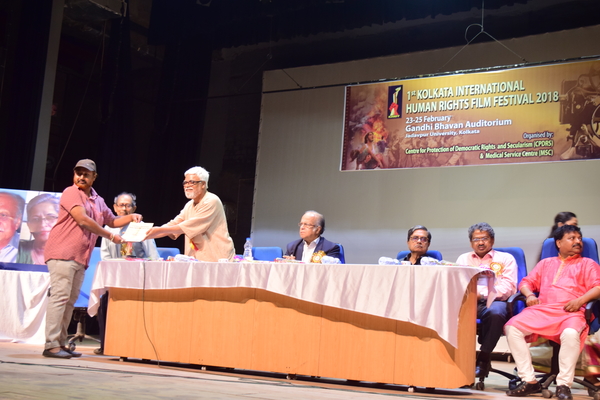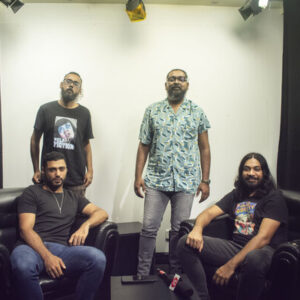The 1st Kolkata International Human Rights Film Festival (KIHRFF) organised by the Centre For Protection Of Democratic Rights & Secularism (CPDRS) and Medical Service Centre (MSC) began with mammoth support from Filmmakers, Human Right Activists, Academicians, Legal Professionals, Students and the common people on the 23rd of February 2018 at the Gandhi Bhavan, Jadavpur University in Kolkata.
Justice Chittatosh Mukherjee inaugurated the festival. Eminent Filmmaker and Human Rights activist Meghnath was present as the chief guest. Very famous filmmaker and critic Subhas Borker from New Delhi, distinguished filmmaker Supriyo Sen, Dr. Partha Pratim Lahiri, the Registrar of Jadavpur University, Dr. Tarun Kanti Naskar, Professor Jadavpur University and Dr. Payel Rai Chowdhury Dutt, Professor Rabindrabharati University also graced the inaugural ceremony.
Justice Mukherjee focusing on the need for human rights movement congratulated the organisers CPDRS and Medical Service Centre for starting the 1st Human Rights Film Festival. Whereas filmmaker Supriyo Sen stressed on the need for such a festival to showcase important films that are being made worldwide on human rights violation, Meghnath went a step forward and asked today’s generation to take up the camera and shoot wherever they see any defilement of rights.
The Festival opened with the famous film of 2002, ‘Rabbit Proof Fence’ directed by Philip Noyce made on the predicament of the native people of Australia whose children were forcibly abducted by the white government agencies to be trained to become domestic help. ‘Woh Dhuan’, ‘Silence Please’ and ‘Caste on the Menu Card’ made by the Students of Tata Institute of Social Sciences, ‘The Referendum’ directed by Tarun Mishra from Odisha and ‘Iran Was Never Iran To Me’ directed by Mahyar Javidi from Iran were among the films in the Competition Section on the first day.
The open forum that followed the screenings had a panel discussion on “Films in Human Rights Movements” where eminent filmmakers, social activists and academicians shared their views on the importance of films in Human Rights Movements and how modern technology can be and should be used to create awareness about Human Right issues. The interactive session at the end of the discussion had enthusiastic participation from people from all walks of life.
The day ended with two special screenings, ‘Dark Frames’- a film from Kashmir and a very renowned film from Palestine on Human rights abuse ‘5 Broken Cameras’ by Emad Burnat.
KIHRFF entered its second day on the 24th of February 2018 with more enthusiasim and passion. People assembled at the Gandhi Bhavan auditorium in large numbers to watch meaningful, thought provoking films on Human Rights concerns.
The day opened with the film directed by Sabnam Firdousi from Bangladesh ‘Janmasathi’ (Born Together) made on the children born of raped victims of the Bangladesh freedom War of 1971. This 71 minute long film kept the viewers engaged as they kept questioning the role of the state in giving due respect to the victims of rape and the children of war.
‘ A Death: Few Arguments’ was another significant film in the special screening section that spoke of the struggle and death of the social activist Sankar Guha Neogi. ‘Himalayan Refugees’ – a film on the plight of the Ahmedi Muslims of Pakistan who have to lead a life of illegal migrants in Nepal, was the most important film in the competition section.
‘The Hunt’ directed by Biju Toppo of Jharkhand, ‘Naam Poribortito’- a film by Mitali from Kolkata and ‘Chakwa’ a film by the students of Tata Institute of Social Sciences were the other films in Competition. After every screening session there was a lively interaction with the makers of the films that expressed the directors’ struggle to make such films amidst all odds.
A panel discussion on ‘Films on Migration’ was also scheduled in the evening amidst the film screenings. Eminent filmmakers, consultants to film festivals, social activists, academicians and people from the house participated with enthusiasm and zeal in the open forum. The day ended with the award winning film of Supriyo Sen ‘Death Dies Last in War’.
25th February 2018, the third and final day of the festival began with a minute’s silence observed for the sudden demise of eminent actress Sridevi the previous night. The final day was a day of special screenings were eminent filmmakers presented their films.
‘Monotone of a Sinking Womb’ a creative visual experiment on violence on women, directed Abradeep Ghatak, ‘Nandigram Genocide’ a film on the mass killing by the state in Nandigram in 2007 directed by Indrani, ‘Remembering Gujrat’- a film on the Gujrat genocide in 2002 directed by Soumitra Dastidar, ‘Syria- In search of truth’ a film on the plight of the Syrian people by Papia Ghoshal, ‘Free Prisioner’- A film from Turkey directed by Guler Zere and ‘Farooq Vs State’ – a film from the series Remembering 1992 by the students of TISS were among the important films screened though out the day.
The main attraction of the final day was the closing ceremony and the award giving function that followed. Former Justice Samaresh Banerjee (first Lokatie of State of West Bengal), Justice Ashoke Ganguly (former Judge Supreme Court Of India & former Chairperson, West Bengal Human Rights Commission), Meghnath (Filmmaker & Human Right Activist), Dr. Bigyan Bera (General Secretary MSC) and Dr. Subhas Dasgupta (President CPDRS) and Professor Dr. Pranab Dasgupta (General Secretary CPDRS) were present for the valedictory session and the award ceremony.
The film ‘Himalayan Refugees’ by Nikhil Singh Rajput was awarded the Best Film. The Best Direction award was given to Biju Toppo for his film ‘The Hunt’.The award for Best Film on Social Relevance was jointly presented to two of the films from TISS ‘Woh Dhuan’ and ‘Caste on the Menu Card’. ‘Iran Was Never Iran to Me’ directed by Mahyar Javidi won the Jury’s Special Mention award.
The first Kolkata International Human Rights Films Festival closed with a very pertinent and apt film ‘AFSPA 1958’ by Haoban Paban Kumar from Manipur.
The three day festival that is the first of its kind in the country contained both competitive and non-competitive sections. It screened 32 films from 3 continents, 8countries and 9 states.
KIHRFF marked a new beginning in the History of Human Rights consiousness. It intends to form a cultural platform where images and sound would be instrumental in the dissemination and awareness generation of human rights issues.
With the inspiration and collaboration of human rights activists, filmmakers, social workers, academicians, journalists, legal personnel, students and above all with the whole hearted support of the common people KIHRFF is bound to go a along way in intensifying the proliferating the global movement against Human Rights violation.
> Pratyusha Mukherjee














